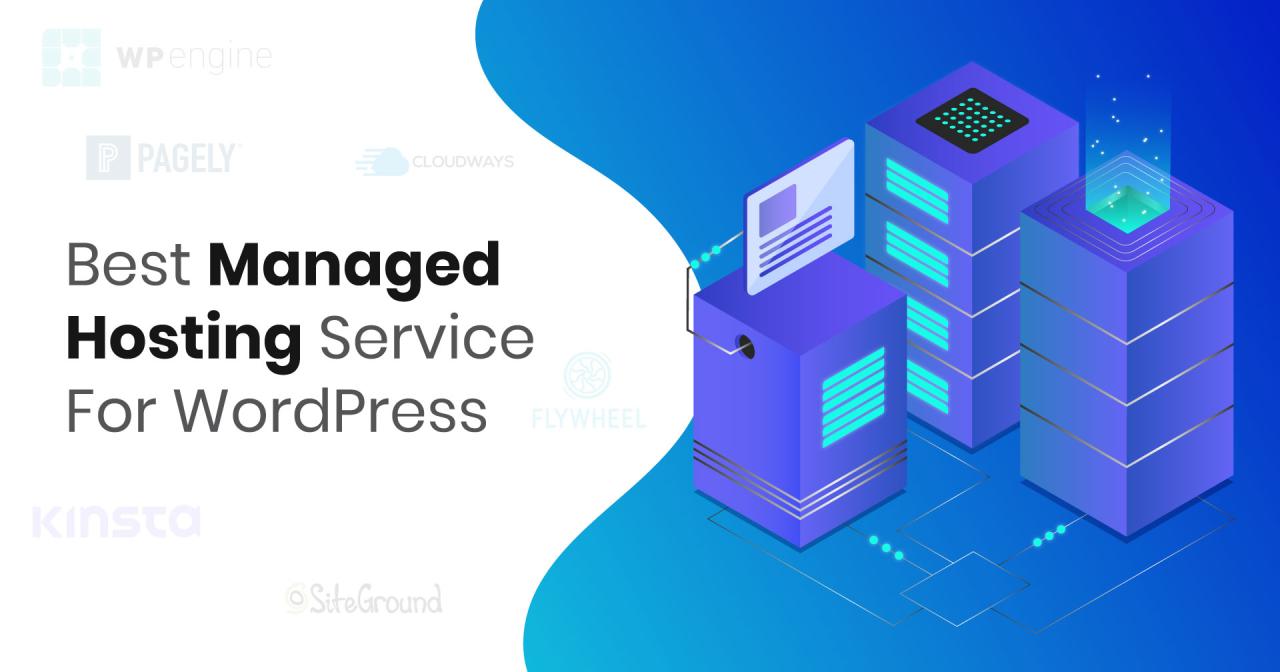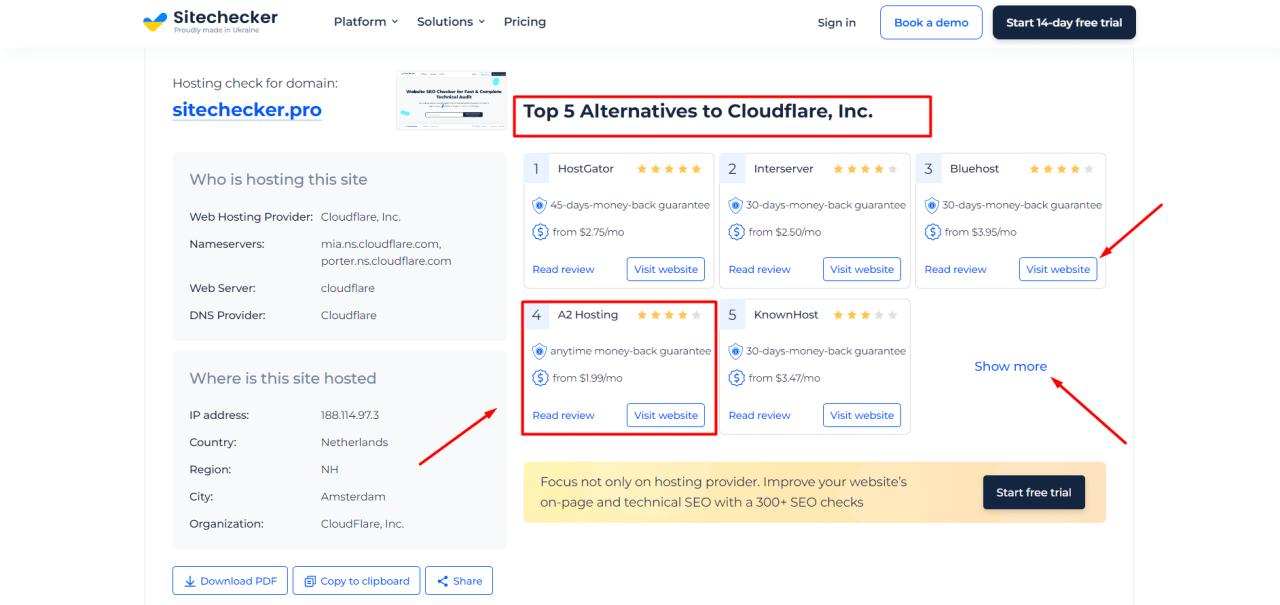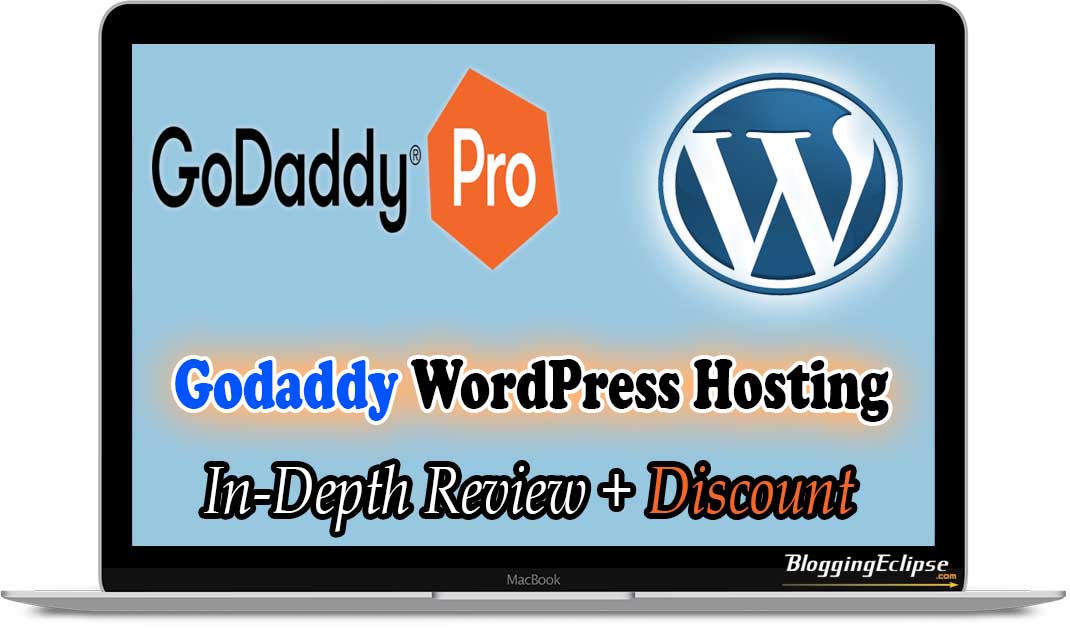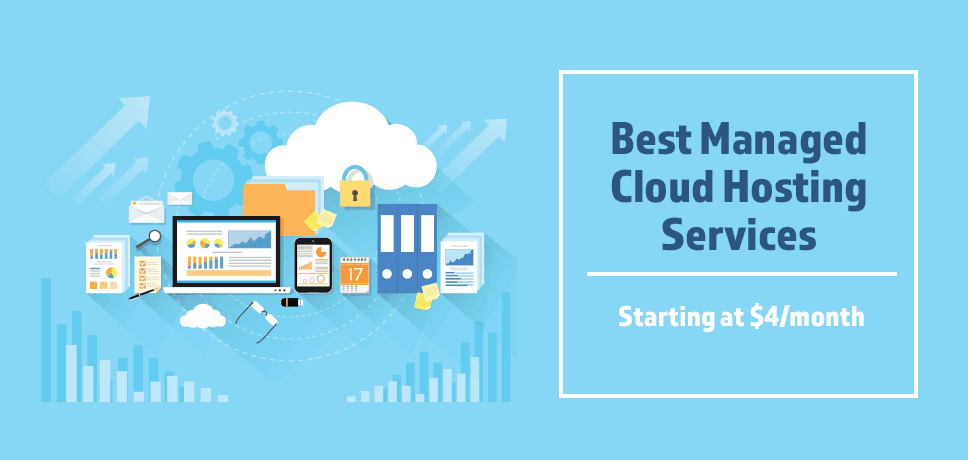Managed hosting takes the complexities of server administration off your plate, allowing you to focus on what truly matters: your website’s success. This approach, unlike traditional hosting, provides a comprehensive solution that encompasses everything from server management and security to performance optimization and expert support.
Imagine a world where your website runs smoothly, effortlessly handling even the heaviest traffic, while you enjoy peace of mind knowing that security and performance are in expert hands. This is the promise of managed hosting, a service that caters to businesses of all sizes, empowering them to achieve their online goals with confidence.
What is Managed Hosting?
Managed hosting is a type of web hosting service where the hosting provider handles all aspects of server management, including hardware, software, security, and maintenance. This differs from traditional hosting, where users are responsible for managing their own servers.
Managed hosting offers a range of benefits, including increased reliability, security, and performance. With managed hosting, businesses can focus on their core operations, knowing that their website is in good hands.
Key Features and Benefits of Managed Hosting
Managed hosting services offer a comprehensive suite of features and benefits designed to simplify server management and enhance website performance. Here are some of the key aspects:
- Server Management: The hosting provider handles all server-related tasks, including hardware maintenance, software updates, security patching, and system monitoring.
- Security: Managed hosting providers implement robust security measures to protect websites from threats such as malware, DDoS attacks, and unauthorized access.
- Performance Optimization: Managed hosting providers optimize server configurations and resources to ensure optimal website performance, including speed, responsiveness, and uptime.
- Scalability: Managed hosting services allow businesses to scale their hosting resources up or down as needed to accommodate traffic fluctuations and growth.
- Support and Monitoring: Managed hosting providers offer 24/7 technical support and monitoring services to address any issues or concerns promptly.
Types of Managed Hosting Services
Managed hosting services are available in various forms, catering to different needs and budgets. Here are some common types:
- Shared Managed Hosting: This is a cost-effective option where multiple websites share the same server resources. While offering some management benefits, it may have limited control and scalability compared to dedicated solutions.
- VPS Managed Hosting: This provides a dedicated virtual server environment with more control and resources than shared hosting. It offers greater flexibility and performance, but comes at a higher cost.
- Dedicated Managed Hosting: This involves a dedicated physical server exclusively for a single website or application. It provides the highest level of control, performance, and security, but is also the most expensive option.
- Cloud Managed Hosting: This leverages cloud computing infrastructure to provide scalable, flexible, and cost-effective hosting solutions. It offers on-demand resource allocation, pay-as-you-go pricing, and high availability.
Managed Hosting vs. Self-Managed Hosting
Choosing the right hosting solution for your website or application can be a critical decision that impacts performance, security, and overall success. Managed hosting and self-managed hosting are two distinct approaches, each with its own advantages and disadvantages. Understanding the key differences between these options can help you make an informed decision based on your specific needs and technical expertise.
Managed Hosting vs. Self-Managed Hosting
Managed hosting and self-managed hosting represent two contrasting approaches to server management and infrastructure control. In managed hosting, a third-party provider handles all aspects of server maintenance, security, and software updates, leaving you to focus on your website or application. Conversely, self-managed hosting grants you complete control over the server environment, requiring you to manage all technical aspects.
Advantages of Managed Hosting
- Simplified Management: Managed hosting eliminates the burden of server administration, freeing you from tasks like operating system updates, security patches, and server monitoring. This allows you to concentrate on developing and growing your website or application.
- Enhanced Security: Managed hosting providers typically implement robust security measures, including firewalls, intrusion detection systems, and regular security audits. This helps mitigate the risk of cyberattacks and data breaches.
- Performance Optimization: Managed hosting providers often have expertise in optimizing server performance, ensuring your website or application runs smoothly and efficiently. This includes tasks like load balancing, caching, and database optimization.
- 24/7 Support: Managed hosting providers usually offer 24/7 technical support, providing prompt assistance for any issues that arise. This can be particularly valuable for critical applications or websites with high traffic volumes.
Disadvantages of Managed Hosting
- Limited Control: Managed hosting providers typically restrict access to the server environment, limiting your ability to customize configurations or install specific software. This can be a constraint for applications with unique requirements or developers who prefer complete control.
- Higher Costs: Managed hosting services usually come at a higher cost compared to self-managed hosting, as you are paying for the expertise and resources of the hosting provider. This cost can vary depending on the features and level of support included.
- Potential for Vendor Lock-in: Choosing a managed hosting provider can lead to vendor lock-in, making it challenging to switch providers later. This is due to the reliance on the provider’s infrastructure and services, potentially impacting flexibility and future scalability.
Advantages of Self-Managed Hosting
- Complete Control: Self-managed hosting grants you full control over the server environment, allowing you to customize configurations, install software, and manage resources according to your specific needs.
- Cost-Effectiveness: Self-managed hosting can be more cost-effective in the long run, as you only pay for the hardware and software you require. This can be advantageous for projects with limited budgets or specific resource requirements.
- Flexibility and Scalability: Self-managed hosting offers greater flexibility and scalability, allowing you to easily adjust resources and configurations as your website or application grows. This can be crucial for businesses experiencing rapid growth or unexpected traffic spikes.
Disadvantages of Self-Managed Hosting
- Technical Expertise Required: Self-managed hosting demands significant technical expertise, including server administration, security management, and software updates. This can be a challenge for individuals or businesses without the necessary skills or resources.
- Time Commitment: Managing a server environment requires a considerable time commitment, especially for tasks like security updates, server maintenance, and troubleshooting. This can be a significant burden for individuals or businesses with limited time or resources.
- Increased Risk: Self-managed hosting involves a higher risk of security breaches and downtime, as you are responsible for all aspects of server security and maintenance. This can be a significant concern for sensitive data or critical applications.
Scenarios for Choosing Managed Hosting or Self-Managed Hosting
The choice between managed hosting and self-managed hosting depends on several factors, including your technical expertise, budget, and website or application requirements.
Scenarios Favoring Managed Hosting
- Limited Technical Expertise: If you lack the necessary technical skills to manage a server environment, managed hosting is a suitable option, as it relieves you of the burden of server administration.
- High-Traffic Websites or Applications: For websites or applications experiencing high traffic volumes, managed hosting can provide the necessary resources and expertise to ensure optimal performance and availability.
- Security Concerns: If security is a primary concern, managed hosting offers robust security measures and 24/7 support, mitigating the risk of cyberattacks and data breaches.
- Limited Budget: While managed hosting can be more expensive upfront, it can be cost-effective in the long run, as it eliminates the need for specialized staff and infrastructure investments.
Scenarios Favoring Self-Managed Hosting
- Technical Expertise: If you have the technical expertise and resources to manage a server environment, self-managed hosting can offer greater control and flexibility.
- Unique Requirements: For applications with specific requirements or customizations, self-managed hosting provides the freedom to install software, configure settings, and manage resources according to your needs.
- Cost Optimization: Self-managed hosting can be more cost-effective in the long run, especially for projects with limited budgets or specific resource requirements.
- Scalability: Self-managed hosting offers greater scalability, allowing you to easily adjust resources and configurations as your website or application grows.
Key Components of Managed Hosting

Managed hosting is a comprehensive solution that takes care of all the technical aspects of running a website or application, freeing you to focus on your core business. It’s like having a team of experts working behind the scenes to ensure your online presence is always up and running smoothly.
Server Management
Server management is a crucial aspect of managed hosting. It encompasses all the tasks related to keeping your servers healthy and performing optimally. These tasks include:
- Server setup and configuration: This involves setting up the server with the appropriate operating system, software, and security configurations to meet your specific needs.
- Server monitoring and maintenance: Managed hosting providers constantly monitor your servers for performance issues, security threats, and potential problems. They also perform regular maintenance tasks, such as software updates and security patches, to keep your servers running smoothly.
- Resource allocation and optimization: Managed hosting providers ensure your servers have the right amount of resources, such as CPU, memory, and storage, to handle your website’s traffic and workloads. They also optimize server performance by fine-tuning configurations and using advanced caching techniques.
- Server backups and disaster recovery: Managed hosting providers take regular backups of your data to protect against data loss. They also have disaster recovery plans in place to restore your website quickly and efficiently in case of a server failure or other unforeseen event.
Security
Security is paramount in today’s digital world. Managed hosting providers offer comprehensive security measures to protect your website and data from threats. These measures include:
- Firewall protection: Firewalls act as a barrier between your servers and the outside world, blocking unauthorized access and malicious traffic.
- Intrusion detection and prevention systems (IDS/IPS): These systems monitor network traffic for suspicious activity and take action to prevent attacks.
- Regular security audits and vulnerability scanning: Managed hosting providers regularly scan your servers for vulnerabilities and security weaknesses to identify and address potential threats proactively.
- Malware and virus protection: Managed hosting providers use advanced security software to detect and remove malware and viruses from your servers.
- Data encryption: Managed hosting providers encrypt your data both in transit and at rest to protect it from unauthorized access.
Performance Optimization
Performance is essential for any website or application. Managed hosting providers use various techniques to optimize the performance of your servers and ensure a smooth user experience. These techniques include:
- Content Delivery Network (CDN): A CDN distributes your website’s content across multiple servers located around the world, reducing latency and improving loading times for users in different locations.
- Caching: Caching stores frequently accessed data in memory, allowing your servers to deliver content faster. This reduces the load on your servers and improves overall performance.
- Load balancing: Load balancing distributes traffic across multiple servers, preventing any single server from becoming overloaded. This ensures your website remains responsive even during peak traffic periods.
- Database optimization: Managed hosting providers optimize your database for performance, ensuring it can handle queries and requests efficiently.
Support and Expertise
Managed hosting providers offer various levels of support and expertise to meet the specific needs of their clients. These levels of support typically include:
- 24/7 technical support: Managed hosting providers offer round-the-clock technical support to help you resolve any issues that may arise. You can contact their support team via phone, email, or live chat.
- Proactive monitoring and maintenance: Managed hosting providers monitor your servers proactively to identify and address potential issues before they impact your website’s performance.
- Security expertise: Managed hosting providers have dedicated security teams that can help you protect your website from threats and ensure compliance with industry standards.
- Performance optimization services: Managed hosting providers offer performance optimization services to help you improve your website’s speed and responsiveness.
- Custom solutions: Some managed hosting providers offer custom solutions tailored to your specific needs. This can include specialized security measures, performance optimization techniques, or other services that are not part of their standard offerings.
Benefits of Managed Hosting

Managed hosting offers a range of benefits for businesses of all sizes, from startups to large enterprises. By entrusting the management of your server infrastructure to a specialized provider, you can focus on your core business operations while ensuring optimal website performance, security, and reliability.
Increased Website Performance
Managed hosting providers invest in cutting-edge hardware and software, ensuring your website runs smoothly and efficiently. Their expertise in server optimization and configuration guarantees optimal performance, resulting in faster loading times, reduced bounce rates, and improved user experience.
- Faster loading times: Managed hosting providers use powerful servers and advanced caching mechanisms to deliver content quickly, minimizing website load times and improving user satisfaction.
- Reduced downtime: Proactive server monitoring and maintenance by managed hosting providers minimize downtime, ensuring your website remains accessible to customers 24/7.
- Scalability: Managed hosting providers offer flexible scaling options, allowing you to adjust resources based on your website’s traffic fluctuations and ensure optimal performance during peak periods.
Enhanced Security
Managed hosting providers implement robust security measures to protect your website from cyber threats. They proactively monitor for vulnerabilities, apply security patches, and provide comprehensive security solutions, ensuring your data and customer information are safe.
- Firewall protection: Managed hosting providers deploy advanced firewalls to block malicious traffic and prevent unauthorized access to your website.
- Regular security updates: They keep your server software and applications up-to-date with the latest security patches, mitigating potential vulnerabilities.
- Malware detection and removal: Managed hosting providers employ sophisticated tools to detect and remove malware, protecting your website from malicious attacks.
Improved Reliability
Managed hosting providers offer 24/7 monitoring and support, ensuring your website remains operational and accessible to customers. They proactively address any issues, ensuring minimal downtime and a seamless user experience.
- 24/7 monitoring: Managed hosting providers continuously monitor your website’s performance and identify potential issues before they impact users.
- Proactive maintenance: They perform regular maintenance tasks, such as software updates and server optimization, to ensure optimal website performance and stability.
- Fast response times: In case of issues, managed hosting providers offer swift response times and technical support, minimizing downtime and resolving problems quickly.
Managed Hosting for Different Platforms
Managed hosting is a popular choice for website owners who want to focus on their content and business, rather than worrying about the technical details of running their website. But, choosing the right managed hosting solution can be tricky, especially when you consider the various platforms available. This section delves into the specifics of managed hosting for popular platforms like WordPress, Drupal, and Magento.
WordPress Managed Hosting
WordPress is the most popular content management system (CMS) globally, powering over 43% of all websites. Its ease of use and flexibility make it a favorite among bloggers, businesses, and individuals alike. Managed WordPress hosting providers offer tailored solutions to address the specific needs of WordPress websites.
These providers offer various features, including:
- Automatic WordPress Updates: Updates are crucial for security and performance, and managed WordPress hosting providers handle these automatically, ensuring your site is always up-to-date.
- Optimized Performance: Managed WordPress hosting is designed for speed and efficiency. Providers use caching mechanisms, content delivery networks (CDNs), and other optimizations to ensure your website loads quickly.
- Enhanced Security: Security is paramount for any website. Managed WordPress hosting providers offer robust security measures like firewalls, malware scanning, and regular backups to protect your site from attacks.
- Expert Support: WordPress experts are available 24/7 to help with any issues or questions you might have. This ensures you have the support you need to keep your website running smoothly.
Some popular managed WordPress hosting providers include:
- WP Engine: Known for its robust security, speed, and excellent support, WP Engine is a leading managed WordPress hosting provider.
- Kinsta: Kinsta provides high-performance hosting with a focus on speed and scalability. Their Google Cloud platform ensures a reliable and secure environment.
- Flywheel: Flywheel is a popular choice for agencies and freelancers, offering a user-friendly interface and a focus on collaboration tools.
Drupal Managed Hosting
Drupal is another popular CMS known for its flexibility and scalability. While it might be slightly more complex than WordPress, Drupal offers a powerful platform for building complex websites and web applications.
Managed Drupal hosting providers offer specific features tailored to Drupal websites:
- Drupal-Specific Expertise: Managed Drupal hosting providers have dedicated teams with in-depth knowledge of Drupal. They can help with complex configurations, module management, and performance optimization.
- Security and Maintenance: Drupal websites require specific security measures and regular updates. Managed hosting providers ensure your site is secure and up-to-date, reducing the risk of vulnerabilities.
- Performance Optimization: Managed Drupal hosting providers optimize your site for speed and efficiency. They use caching techniques, database optimization, and other tools to ensure a smooth user experience.
- Scalability and Flexibility: Drupal websites can grow complex and require scalable hosting solutions. Managed Drupal hosting providers offer flexible plans that can adapt to your changing needs.
Some of the leading managed Drupal hosting providers include:
- Pantheon: Pantheon is a popular choice for Drupal developers and agencies. They offer a platform that simplifies Drupal development and deployment, with features like Git integration and automated testing.
- Acquia: Acquia is a leading provider of managed Drupal hosting, offering a comprehensive platform with a wide range of services, including security, performance, and development tools.
- Platform.sh: Platform.sh is a cloud-based platform that offers a flexible and scalable solution for Drupal websites. It features a user-friendly interface and a focus on automation.
Magento Managed Hosting
Magento is a popular e-commerce platform that powers many online stores. Its advanced features and customization options make it a favorite among businesses looking to build robust online stores.
Managed Magento hosting providers offer specialized features to meet the unique demands of e-commerce websites:
- Optimized Performance: Magento websites are often complex and require high-performance hosting. Managed Magento hosting providers use optimized servers and caching techniques to ensure your store loads quickly.
- Scalability and Reliability: E-commerce websites need to be scalable and reliable, especially during peak shopping seasons. Managed Magento hosting providers offer plans that can adapt to your changing traffic needs.
- Security and Compliance: Security is crucial for e-commerce websites, which handle sensitive customer data. Managed Magento hosting providers offer robust security measures and compliance with industry standards like PCI DSS.
- Magento Expertise: Managed Magento hosting providers have teams of experts who can help with complex configurations, theme development, and performance optimization.
Some of the best managed Magento hosting providers include:
- Nexcess: Nexcess specializes in managed Magento hosting, offering a high-performance platform with a focus on speed and scalability.
- Cloudways: Cloudways is a popular cloud hosting platform that offers managed Magento hosting on various cloud providers, giving you flexibility and control.
- MageMojo: MageMojo is a managed Magento hosting provider that offers a user-friendly platform with a focus on performance, security, and support.
Choosing the Right Managed Hosting Provider
Selecting the perfect managed hosting provider is crucial for ensuring your website or application runs smoothly and efficiently. With so many options available, making the right choice can feel overwhelming. This section will guide you through the essential factors to consider when evaluating potential providers.
Factors to Consider When Choosing a Managed Hosting Provider
When choosing a managed hosting provider, it’s essential to assess their capabilities and align them with your specific requirements. Key factors to consider include:
- Pricing
- Features
- Performance
- Customer Support
Pricing, Managed hosting
Pricing is a significant consideration, especially for businesses with limited budgets. While cost-effective options are attractive, it’s crucial to understand the value you receive for the price. Consider factors like:
- Pricing models: Explore different pricing models, such as pay-as-you-go, fixed monthly fees, or tiered plans based on resource consumption.
- Hidden fees: Be aware of potential hidden fees, such as setup costs, renewal fees, or charges for additional resources or support services.
- Value for money: Evaluate the features, performance, and support offered at each price point to ensure you get the best value for your investment.
Features
Features are essential for ensuring your website or application functions as intended. Evaluate the following features:
- Server specifications: Consider the server specifications, such as CPU cores, RAM, storage space, and network bandwidth, to ensure they meet your performance requirements.
- Operating systems and software: Determine the operating systems and software supported by the provider, ensuring compatibility with your website or application.
- Security features: Assess the security features offered, such as firewalls, intrusion detection systems, and malware scanning, to protect your data and applications.
- Scalability and flexibility: Ensure the provider offers scalable solutions that can accommodate your future growth and changing needs.
- Backup and recovery: Confirm the provider offers regular backups and reliable recovery options to protect your data in case of system failures or disasters.
- Monitoring and reporting: Explore the provider’s monitoring and reporting capabilities, including performance metrics, security alerts, and usage statistics.
Performance
Performance is critical for a positive user experience. Factors to consider include:
- Server uptime: Evaluate the provider’s uptime guarantee, ensuring high availability and minimal downtime.
- Page load times: Investigate the provider’s average page load times and their impact on user engagement and search engine rankings.
- Network bandwidth: Consider the provider’s network bandwidth to ensure sufficient capacity for handling traffic spikes and delivering content quickly.
- Performance optimization: Determine if the provider offers performance optimization tools and services to enhance website or application speed.
Customer Support
Customer support is crucial for addressing technical issues and ensuring a smooth experience. Consider:
- Availability: Evaluate the availability of customer support, including response times, support channels (phone, email, chat), and hours of operation.
- Expertise: Ensure the support team has the expertise to resolve technical issues and provide guidance on best practices.
- Proactive support: Determine if the provider offers proactive monitoring and support to identify and resolve potential issues before they impact your website or application.
Questions to Ask Potential Managed Hosting Providers
To ensure you make an informed decision, ask potential providers the following questions:
- What are your pricing models and what services are included in each plan?
- What server specifications and resources are available?
- What operating systems and software are supported?
- What security features do you offer?
- How do you handle backups and data recovery?
- What is your uptime guarantee and how do you monitor performance?
- What customer support options are available and what are your response times?
- Can you provide references or case studies of similar clients?
- What is your cancellation policy?
Managed Hosting Security
Managed hosting providers prioritize security to protect their clients’ websites and data. They implement a comprehensive set of security measures, both proactive and reactive, to prevent and mitigate potential threats.
Security Measures Implemented by Managed Hosting Providers
Managed hosting providers employ a variety of security measures to safeguard their clients’ websites and data. These measures include:
- Firewalls: Firewalls act as a barrier between the internet and the hosting server, blocking unauthorized access and malicious traffic. They analyze incoming and outgoing network traffic and filter out any suspicious activity.
- Intrusion Detection and Prevention Systems (IDPS): IDPS continuously monitor network traffic for malicious activity and take immediate action to prevent attacks. They can detect and block known attack patterns, such as SQL injection and cross-site scripting (XSS).
- Regular Security Audits: Managed hosting providers conduct regular security audits to identify and address vulnerabilities. These audits involve scanning for weaknesses in the server infrastructure, software, and applications.
- Security Patching and Updates: Keeping software up-to-date is crucial to prevent exploits. Managed hosting providers ensure that all software on their servers, including the operating system, applications, and plugins, are patched and updated regularly.
- Data Encryption: Managed hosting providers use encryption to protect sensitive data, such as customer information and financial transactions. This ensures that data remains confidential even if it is intercepted.
- Access Control and Authentication: Access to the server and its resources is restricted to authorized personnel. Strong authentication mechanisms, such as two-factor authentication, are implemented to prevent unauthorized access.
- Disaster Recovery and Backup: Managed hosting providers have disaster recovery plans in place to minimize downtime in case of a security incident or other unforeseen events. They also provide regular data backups to ensure data recovery.
How Managed Hosting Can Protect Websites from Threats
Managed hosting providers play a crucial role in protecting websites from various threats, including:
- Malware: Managed hosting providers use malware detection and removal tools to identify and eliminate any malicious software that may have infected the server or website. They also monitor for suspicious activity and take immediate action to contain the spread of malware.
- DDoS Attacks: DDoS attacks aim to overwhelm a website with traffic, making it unavailable to legitimate users. Managed hosting providers have measures in place to mitigate DDoS attacks, such as traffic filtering and rate limiting.
- Data Breaches: Managed hosting providers implement strong security measures to protect sensitive data from unauthorized access. They use encryption, access control, and other security protocols to minimize the risk of data breaches.
Security Features Offered by Different Managed Hosting Providers
| Provider | Security Features |
|---|---|
| Provider A | Firewalls, intrusion detection, malware scanning, data encryption, access control, security patching, regular audits, disaster recovery |
| Provider B | Firewalls, intrusion prevention, malware protection, data encryption, access control, security updates, regular security checks, backup and recovery |
| Provider C | Firewalls, intrusion detection and prevention, malware scanning, data encryption, access control, security patching, regular security audits, DDoS protection, backup and recovery |
Managed Hosting Performance
Website performance is crucial for success in today’s digital landscape. A slow website can lead to frustrated users, lost conversions, and damage to your brand reputation. Managed hosting plays a vital role in optimizing website performance, ensuring a smooth and enjoyable user experience.
Factors Contributing to Website Performance
Managed hosting environments offer several features and advantages that directly impact website performance. Here are some key factors:
- Server Infrastructure: Managed hosting providers invest in high-quality servers with powerful processors, ample RAM, and fast storage solutions. This ensures your website has the resources it needs to operate efficiently. For example, using solid-state drives (SSDs) instead of traditional hard disk drives (HDDs) significantly reduces loading times.
- Network Optimization: Managed hosting providers optimize their network infrastructure to minimize latency and ensure data transfer speeds. This is particularly important for websites with a global audience.
- Caching Mechanisms: Caching is a technique that stores frequently accessed website data in temporary storage. This reduces the need to fetch data from the server every time a user visits the site, resulting in faster load times. Managed hosting providers often implement sophisticated caching solutions like Varnish or Redis.
- Content Delivery Networks (CDNs): CDNs distribute website content across multiple servers worldwide, allowing users to access it from the closest server, reducing latency and improving load times. Many managed hosting providers offer CDN integration as part of their service.
- Regular Maintenance and Updates: Managed hosting providers handle server maintenance, software updates, and security patches, ensuring your website remains stable and up-to-date. This eliminates the burden of managing these tasks yourself, which can be time-consuming and require specialized knowledge.
Optimizing Website Speed and Load Times
Managed hosting solutions are designed to optimize website speed and load times through various methods:
- Server Optimization: Managed hosting providers fine-tune server configurations to ensure optimal resource allocation for your website. This includes adjusting settings for PHP, MySQL, and other software components.
- Code Optimization: Managed hosting providers can help you identify and optimize website code for better performance. This might involve minifying CSS and JavaScript files, compressing images, and optimizing database queries.
- Load Balancing: Load balancing distributes traffic across multiple servers, preventing a single server from becoming overloaded and ensuring consistent performance. This is particularly important for websites with high traffic volumes.
Performance Metrics
Several key performance metrics can be used to measure the effectiveness of managed hosting solutions:
- Page Load Time: This measures the time it takes for a website page to fully load in a user’s browser. Faster page load times are essential for user satisfaction and search engine ranking.
- Time to First Byte (TTFB): This measures the time it takes for the server to start sending data to the user’s browser. A low TTFB indicates a responsive server and a fast website.
- Server Response Time: This measures the time it takes for the server to respond to a user request. A low server response time is crucial for a smooth user experience.
- Website Uptime: This measures the percentage of time a website is available to users. Managed hosting providers typically guarantee high uptime levels, ensuring minimal downtime.
Managed Hosting Costs
Managed hosting services offer a range of benefits, but they also come with a cost. Understanding the typical costs associated with managed hosting and how pricing models vary can help you make an informed decision about whether it’s the right fit for your needs.
Pricing Models of Managed Hosting Providers
Different managed hosting providers offer various pricing models. Here are some common ones:
- Fixed Monthly Fees: This is the most common model, where you pay a fixed amount each month for the services included in your plan. This provides predictable budgeting and can include features like server management, security updates, and backups.
- Usage-Based Pricing: Some providers charge based on your resource consumption, such as CPU, memory, or storage. This can be advantageous if your resource needs fluctuate significantly, as you only pay for what you use. However, it can make budgeting less predictable.
- Pay-as-you-go: This model allows you to pay for resources as you need them, offering flexibility and potentially lower costs for infrequent usage. However, it can be more complex to manage and might not be suitable for high-traffic websites or applications.
- Tiered Pricing: Some providers offer different pricing tiers based on the level of service and resources included. Higher tiers typically offer more features and resources, but come at a higher cost.
Factors Influencing Managed Hosting Costs
Several factors can influence the cost of managed hosting services. These include:
- Server Resources: The amount of CPU, memory, storage, and bandwidth you require will directly impact the cost. Higher resource requirements typically lead to higher costs.
- Platform and Operating System: Hosting platforms like WordPress or Drupal, and operating systems like Linux or Windows, can influence pricing. Some providers specialize in specific platforms and might offer more competitive pricing for them.
- Location: The location of the data center hosting your website or application can impact costs due to differences in infrastructure, labor, and energy prices.
- Level of Support: The level of support you require, such as 24/7 availability, response time guarantees, or specialized expertise, can influence pricing. More comprehensive support typically comes at a higher cost.
- Security Features: Advanced security features like firewalls, intrusion detection systems, and regular security audits can add to the cost.
- Scalability and Flexibility: The ability to scale your resources up or down as needed can affect pricing. Some providers offer flexible scaling options that might come at a premium.
- Data Backup and Recovery: Regular data backups and disaster recovery services can be included in your managed hosting plan, but they can also add to the cost.
Comparing Managed Hosting Costs
When comparing managed hosting providers, it’s essential to consider the following:
- Pricing Transparency: Ensure the provider clearly Artikels their pricing structure and any hidden fees or charges.
- Value for Money: Compare the features and resources included in different plans at various price points to determine the best value for your needs.
- Long-Term Costs: Consider the potential for future growth and scalability when evaluating pricing. Choose a provider that offers flexible options and transparent pricing for scaling your resources as needed.
Case Studies and Examples: Managed Hosting
Real-world examples of businesses successfully implementing managed hosting demonstrate the practical benefits and challenges associated with this approach. These case studies provide insights into how managed hosting can address specific business needs, improve performance, and enhance security.
Case Studies of Successful Managed Hosting Implementations
Several businesses have successfully implemented managed hosting, reaping significant benefits in terms of performance, security, and scalability.
- Example 1: Online Retail Giant – A leading online retailer, facing rapid growth and increasing traffic, implemented managed hosting to handle the surge in demand. The managed hosting provider provided a robust infrastructure, ensuring high availability and scalability, which helped the retailer avoid performance issues and maintain a seamless customer experience.
- Example 2: Financial Services Company – A financial services company, prioritizing security and compliance, opted for managed hosting to safeguard sensitive customer data. The managed hosting provider offered advanced security measures, including intrusion detection systems and regular security audits, ensuring compliance with industry regulations and mitigating potential threats.
- Example 3: Healthcare Provider – A healthcare provider, dealing with sensitive patient data, leveraged managed hosting for its scalability and reliability. The managed hosting provider offered disaster recovery services and data backup solutions, ensuring business continuity and data integrity in case of unforeseen events.
Challenges and Benefits of Managed Hosting Implementation
Implementing managed hosting comes with its own set of challenges and benefits, which vary depending on the specific business needs and the chosen managed hosting provider.
| Challenge | Benefit |
|---|---|
| Finding the Right Managed Hosting Provider: Selecting a provider that aligns with specific business requirements, offers competitive pricing, and provides excellent customer support can be challenging. | Reduced Operational Costs: Outsourcing infrastructure management and maintenance to a managed hosting provider can significantly reduce operational costs associated with staffing, hardware, and software. |
| Migrating Existing Applications and Data: Migrating existing applications and data to a new managed hosting environment can be complex and require careful planning and execution. | Enhanced Performance and Scalability: Managed hosting providers offer optimized infrastructure and resources, ensuring high performance and scalability to meet growing business demands. |
| Maintaining Security and Compliance: Ensuring the security and compliance of data hosted in a managed environment requires careful consideration of the provider’s security measures and compliance certifications. | Improved Security and Compliance: Managed hosting providers offer advanced security features, including firewalls, intrusion detection systems, and regular security audits, ensuring data protection and compliance with industry regulations. |
Closing Summary
In conclusion, managed hosting offers a compelling alternative to self-management, delivering significant benefits for website owners who seek a hassle-free and high-performing online experience. By entrusting the technical aspects of your website to experienced professionals, you can unlock its full potential, focusing your efforts on creating compelling content and engaging your target audience.
Managed hosting takes the weight off your shoulders by handling all the technical aspects of your website, from server maintenance to security updates. This frees you to focus on what matters most: your business. If you’re looking for a scalable and flexible solution, consider transitioning to cloud hosting , which can offer a seamless and cost-effective way to manage your website’s infrastructure.
With managed hosting, you can enjoy the benefits of a robust and reliable platform without the headaches of managing it yourself.




